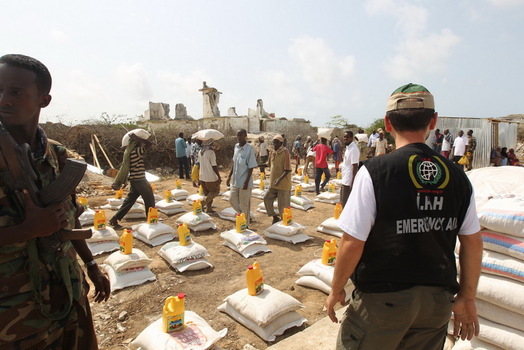
Teams from the IHH Humanitarian Relief Foundation which went to Kenya in the wake of the problems in the region have moved to Somali. IHH emergency aid teams first visited the camps in Mogadishu to figure out what could be done in the medium and long term and they launched relief efforts in the region immediately. IHH Emergency Aid Coordinator Recep Güzel who coordinates relief efforts in Somali after Kenya said what he has witnessed in the camps is the preliminary signs of bigger disasters. Having joined many emergency relief efforts in many parts of the world, Güzel said he has never faced with such a tragedy.
Most deplorable scene I’ve ever seen in my life
Visiting the camps and a women’s-children’s hospital in Mogadishu, Güzel explained: “Following relief efforts in Kenya, we have come to Mogadishu to launch relief efforts here. I can describe the situation here as the end of the humanity. I have joined in emergency relief efforts in many troubled regions of the world but I have never seen such a picture. Since no aid is dispatched to the south of the country out of security concerns, people living there migrate to Mogadishu. There is 500-kilometer of distance for them to cover. People who were already exhausted by drought and hunger walk for kilometers under these circumstances.”
At least one from each family dies
Güzel said people who leave their houses to migrate to Mogadishu experience big problems during their journey to the capital city. “Some people lose their lives on their way to Mogadishu. At least one from each family dies during this challenging journey. Contrary to the situation in Kenya, there are smaller camps here. Around 150-200 families live in each camp,” he said.
It is so sad to wait for the death of a child
Stressing that it is the children again who are most affected by drought and hunger, Güzel shared his impressions from his visit to a women’s and children’s hospital as follows: “People who are able to make it to Mogadishu collapse from exhaustion. Their situation deteriorates due to inadequate nutrition. Let alone walking, women and children cannot even take one step. It is so sad to say this but children are like skeletons. The face of a child was not seen due to the small flies that covered his face in a hospital where we made examinations. He was receiving serum treatment but he was unable to keep his eyes stable. I have never felt myself so desperate throughout my life. A child was slowly dying in front of my eyes but I was able to do nothing to save him.”
Epidemics begin to spread
Güzel also said infectious diseases have begun to rapidly spread in the camps. “Life for the people who were struggling with poverty has gotten more difficult when the drought crisis emerged. There are no adequate supplies in the camps. Diseases rapidly spread. It is very tragic but people are waiting for their death in the camps. Eight children lost their lives within several hours during our visit to a camp where only 100 families live. Since there is no authority in the country, there are not any official figures about what is taking place. It is not exactly known how many people are living in the camps or how many people have lost their lives. There are just estimations about the possible figures.
IHH took relief to 45,000 people
The IHH has delivered food supplies to 45,000 people in the camps in Somali, said Güzel, adding that the amount of food delivered by the IHH will be sufficient during the holy Muslim month of Ramadan. He also added that the IHH will continue its relief efforts in the region.
Please click for online donation
Please click for bank account numbers